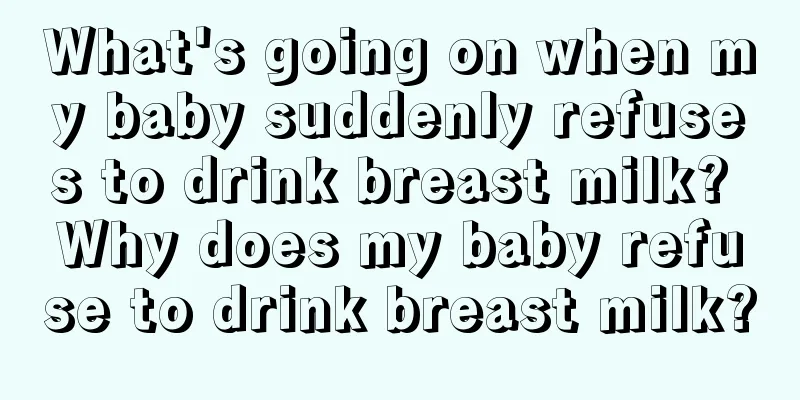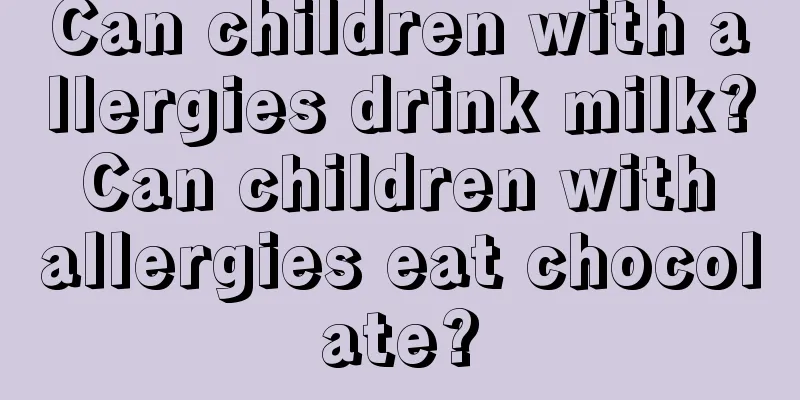What's going on when my baby suddenly refuses to drink breast milk? Why does my baby refuse to drink breast milk?

|
What happens if the baby suddenly refuses to eat breast milk? Many breastfed babies suddenly refuse to eat breast milk at a certain stage. What is going on? Many mothers are confused about this situation. Today I will explain to you why the baby suddenly refuses to eat breast milk. My baby suddenly stopped breastfeeding, what's going on?1. The mother's eating behavior brings a taste that the baby doesn't like to the breast milk or causes discomfort to the baby: The taste of the food eaten by the nursing mother will enter the breast milk about two hours later. The child is particularly sensitive to the taste of breast milk. If he doesn't like the taste or feels uncomfortable after breastfeeding (abdominal pain, bloating, allergies, etc.), he will refuse to breastfeed and cry and be restless. ① Common suspicious foods: spicy foods (chili peppers, garlic, ginger, leeks, etc.); foods that cause flatulence (foods that easily cause flatulence for the mother will also cause flatulence in the child, such as bean sprouts, onions, radishes, etc.); dairy products; pesticides and pollutants (fish from polluted waters, vegetables and fruits with pesticide residues, etc.); foods containing caffeine (coffee, strong tea, beverages, etc.). ② Identify suspicious foods: Most children will feel uncomfortable when their mothers eat a lot of certain foods. Therefore, mothers should make a list of foods and record their children’s symptoms (such as crying, restlessness, abdominal pain, bloating, diarrhea, etc.) to correct their eating habits in time. ③ Confirm the suspicious food: Generally, the discomfort caused by food can last for 24 hours after the mother eats. If the child's symptoms are alleviated or disappear after stopping eating the suspicious food, and the child feels uncomfortable again within 24 hours after eating the suspicious food again, it can be basically confirmed. You should temporarily avoid eating this food in the future. ④ When eating special foods, don’t eat too much at one time. Most children’s sensitivity to food is related to the amount and is temporary. Eating small amounts can reduce the chance of allergies. 2. The milk comes too slowly: When the child is very hungry, he will be annoyed because the milk comes too slowly. Especially the child with an impatient temper will cry after a few mouthfuls and refuse to continue to eat milk. The mother can apply warm compress to the breast, squeeze out a little milk, stimulate the milk ejection reflex, and make the child eat milk as soon as possible. 3. Changes in the mother: Changes in hormones in the body can affect the taste of breast milk. Many mothers say that during their menstrual period, their children do not eat well or often cry and feel restless. At the same time, the mother's nervous and anxious mood can also affect the child. 4. Child's condition: nasal congestion, ear pain, thrush or oral ulcers due to upper respiratory tract infection, manifested by the child's eagerness to feed and crying after feeding. You can ask a doctor to check. Why does the baby not eat breast milk?Mothers can consider the following possibilities: Does your baby have a cold? A sore throat or blocked nose can make him uncomfortable while feeding. Does your baby have ear pain? It hurts more when feeding. Sometimes the baby bites the mother's nipple while feeding, and the mother cries out in pain. The baby is frightened by the mother's strong reaction and stops feeding to avoid being frightened again. There are also some accidents that can cause the baby to be unable to feed temporarily, such as breaking the lip or hurting the tongue, and sometimes these injuries may not be immediately visible. Another common reason for "breastfeeding strike" and sudden weaning is holidays or other busy days, such as moving. When there are many things in life that require the mother's time and energy, it is easy for the mother to postpone the opportunity to spend quiet time with the baby. In the hustle and bustle of cooking, entertaining guests, and shopping, the intimacy of breastfeeding is temporarily or even permanently lost. The baby is temporarily perfunctory with complementary food or a bottle, and the patient baby just waits and waits until suddenly, the baby no longer feeds. Even if you can't immediately identify why the baby refuses to feed, the mother still needs to help the baby return to the nipple as soon as possible. You can try to feed the baby when the baby is drowsy or asleep. Many babies who don't feed when awake will not refuse breast milk when they are sleepy or asleep. Some children do not like their mothers to sit and feed them, but prefer their mothers to hold them and walk around. No matter what the situation is, mothers should spare a few days to focus all their attention on their babies. Holding the baby more, caressing the baby more, and having more direct skin contact with the baby will all help. Letting the baby stay away from the noise of the family and spend some time alone with the mother quietly will also help encourage the baby to return to the mother's nipple. When the baby refuses to breastfeed, do not force him to breastfeed, let the baby fall asleep in your arms. Remember, breastfeeding does not only mean "feeding", but also "comforting". Sometimes babies need to be pampered for a few days before they can return to their previous breastfeeding schedule. During the "strike" period, mothers need to express milk regularly and frequently to ensure that the amount of breast milk secretion does not decrease. At the same time, it also requires the understanding and support of family members, and the patience and perseverance of mothers to persist for a few days to win the baby back to their nipples. One mother said, "Be especially alert to holiday weaning syndrome. In the changing life, these festive days will come again and again, but for the baby, the feeding season only comes once in his life." What to do if your baby refuses to drink breast milkIf a new mother encounters a situation where the baby refuses to breastfeed, she should not be anxious and angry. First, she should rule out whether the baby refuses breast milk due to illness, such as infection or brain damage, nasal or oral inflammation. If the baby is healthy, the mother should not be anxious. First, squeeze some milk and put it into the baby's little mouth. Once the baby tastes the mother's scent, he will instinctively look for the mother. When feeding your baby, you and your baby should face each other and be close to each other. Don't let him only suck your nipple, as this will cause inflammation of your nipples over time. Try to put your nipple and areola into the baby's mouth. Try to relax yourself during breastfeeding and avoid distracting your baby. I believe every baby will instinctively want to breastfeed, so you just need to stimulate their sense of taste! |
<<: Reasons why babies speak late Does it mean that babies who speak late are not smart?
Recommend
Why do children love to eat hair? Maybe they are losing too much zinc!
Love to eat strange things, such as biting nails,...
There are several stages for pregnant women to supplement calcium. What is the best time for pregnant women to supplement calcium every day?
Calcium supplementation is something many people ...
Can babies eat cherries? Benefits of eating cherries for babies
Cherries are relatively expensive fruits, and the...
Is it really useful to go to a beauty salon to get a facial?
Nowadays, many beautiful women like to go to beau...
Can pregnant women eat pig ears? Try to eat less
In fact, pig ears contain a lot of collagen, whic...
How long does it take to quit smoking before you can have a child? How long does it take to be considered successful in quitting smoking?
Smoking is a bad habit that is very harmful to a ...
Can you eat mango before giving birth? What are the precautions for eating mango before giving birth?
Mango is one of the common fruits. Many people lo...
What should pregnant women do if they don’t like to drink water? The consequences of pregnant women not liking to drink water
Drinking water is something we all do every day. ...
Can babies with constipation take probiotics to treat it? What probiotics can babies with constipation take?
Babies usually have very fragile stomachs, so if ...
How to prevent heavy bleeding during childbirth
There will be various unexpected emergencies duri...
What should you say to your baby during prenatal education? What should you pay attention to during prenatal education?
Prenatal education is very important for the baby...
Can Haichang Care Solution be used to soak contact lenses? How long can Haichang Care Solution be used after it is opened?
Like contact lenses, cosmetic contact lenses need...
When is the best time for children to take calcium supplements? How should children take calcium tablets?
Parents hope that their children are as tall as p...
Why do babies pull their ears? Small habits hide big problems
It shows a lack of security. The child cannot exp...
Can pregnant women practice yoga? What are the benefits of pregnant women practicing yoga
Generally speaking, there are many taboos during ...









